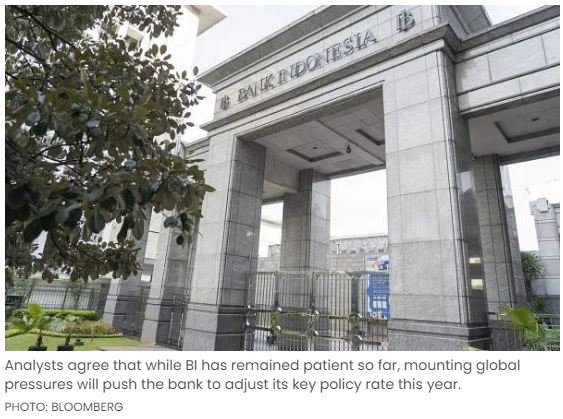Bank Indonesia continues to hold key rate, but slight tightening expected soon: analysts
INDONESIA’s central bank may have been able to hold out on increasing its benchmark 7-day reverse repurchase rate for the 15th consecutive month, but that streak will likely be broken by the end of the year, analysts said in separate reports on Thursday (Jun 23).
Even as other central banks globally have hiked policy rates this year amid the upsurge of inflation pressure, Bank Indonesia (BI) has maintained it at 3.5 per cent, a record low level.
However, analysts expect that this might not be sustainable for much longer. Fitch Solutions’ team of researchers anticipates that “rate hikes should soon follow in the coming months amid a further tightening in global credit conditions”. It maintains its prediction of a “marginal” increase of 50 basis points (bps) to 4 per cent by end-2022.
Similarly, RHB has maintained its call for BI to lift its policy rate to 4 per cent in the later half of the year.
In a report by OCBC Treasury Research, economist Wellian Wiranto said that for the year as a whole, OCBC sees a 75 bps hike in its baseline scenario, with potential for more should the global currency market turn less friendly.
But Wiranto noted that while an “insurance” hike to showcase that BI “does not have any dogmatic allergy to policy tightening” would buffer against potential volatility, the central bank has not yet and does not look likely to do so now.
This signals that “we may well have at least another month of pause by BI to try and squeeze out just that bit more credit growth perhaps, before it entertains the idea of hiking in August, as headline inflation prints get past the 4 per cent handle,” he said.
BI has so far managed to resist tightening monetary policy as its external position and the rupiah remain supported by high commodity prices and inflationary pressures have remained relatively manageable, compared to in other parts of the world.
Fitch Solutions noted that as a major exporter of coal, metals, natural gas and palm oil, Indonesia has been able to “more than offset” the rising costs of crude oil so far this year, supporting the rupiah with its improving trade position. The Indonesian currency “has been holding up much better than most other Asian currencies”, it said in its report.
Indonesia’s trade surplus is also expected to continue as global commodity prices remain elevated through the rest of the year, with no resolution to the Russia-Ukraine war in sight.
Analysts shared the view that BI policymakers viewed inflation to be manageable through state subsidies. OCBC’s Wiranto believes that income from trade has supported its ability to do so. But this is not without its limit, he said.
Barnabas Gan, senior economist at RHB, added that inflation momentum has accelerated in recent months, led especially by increases in prices of food, electricity, gas and fuels, and transportation.
“We expect headline inflation to breach BI’s inflation target as early as September 2022 at 4.1 per cent year on- ear, against BI’s call of 4.2 per cent by end of this year,” he said.
Analysts agree that while BI has remained patient so far, mounting global pressures will push the bank to adjust its key policy rate this year.
The country’s steadily-falling foreign exchange reserves demonstrate an attempt to defend the rupiah through direct foreign exchange intervention, which is unlikely to be sustainable, Fitch Solutions said.
“If BI continues to stand pat amid rising domestic inflation and US rate hikes, real interest rate differentials could start to shift in favour of the greenback, which would lead to downside volatility in the rupiah.”
Source: https://www.businesstimes.com.sg/asean-business/bank-indonesia-continues-to-hold-key-rate-but-slight-tightening-expected-soon


 English
English




